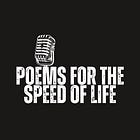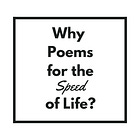S4, E5: "A Christmas Childhood" by Patrick Kavanagh
The fifth episode of the new series of Poems for the Speed of Life, on the theme of Christmas.
Welcome to another episode of Poems for the Speed of Life with Shane Breslin, entrepreneur, writer and poetry advocate.
This is the fifth episode of a new series of the podcast, poems on the theme of Christmas. Today’s poem is "A Christmas Childhood" by Patrick Kavanagh.
Commentary on "A Christmas Childhood" by Patrick Kavanagh
One of my favourite things in poetry, and indeed in all of literature, is how important, vital, global, universal experiences can be represented in the ordinary, everyday observations.
It’s like beauty at its most vast is contained in the smallest of details, and the ordinary produces the extraordinary.
Patrick Kavanagh, the Irish poet who lived and died in the 20th century, is one of the best examples of this ability. In one of his most famous poems, “Epic”, he wrote about being visited by the words of “Homer’s ghost”, who whispered to him that he had “made the Iliad from such A local row”. In another, “Canal Bank Walk”, he wrote, “that I do The will of God [and] wallow in the habitual, the banal”.
This sense of beauty in the specific, of extraordinary in the ordinary, of the will of God being located in the banal and habitual, all of this is present here in Kavanagh’s memories of a Christmas morning from his childhood in County Monaghan, when he was six years old or “six Christmases of age”.
He weaves together the everyday occurrences — frost on potato-pits, the tracks of cattle, a green stone lying sideways in a ditch — with the most wondrous, the most magical, the most sacred — three whin bushes become the three Wise men. A prayer pinned on his blouse, like a white rose on the Virgin Mary’s blouse. Cassiopeia, the cosmic constellation, over Cassidy’s hanging hill. His father’s music makes the stars dance. The light of his mother’s stable-lamp is like the star of Bethlehem.
There's something profound here about how we experience wonder. This is how a child, before the cold maturity of adulthood, sees the world. Everything is potentially miraculous.
The young Kavanagh, his “child poet”, knows he doesn't need to go looking for miracles — they're right there in the everyday world around him.
Everything can glitter. Every sound can contain music.
That line — "Any common sight, the transfigured face / Of a beauty that the world did not touch" — sits at the centre of the poem for me. This sense that beauty is natural, innate, whole, and is eventually spoiled by the touch of the world around it.
This is what joy and peace might be. The ability to stay awake to the extraordinary, the wonderful — literally speaking, full of wonder — the magical and the small and easy to overlook things that can inspire awe.
So maybe this is what the poem has to teach us. That maybe faraway hills are greener. That the miraculous is not something that only happened long ago or only happens in far-off places. That it's right here, in the frost on the fields, in the music of everyday things, in the way ordinary moments can suddenly break themselves open and glisten with a new and inexplicable depth of meaning.
This is the wonder in the child’s eyes, and this wonder is gorgeously brought to us, to our eyes and ears and minds, through the poet’s gift.
For more on themes such as this, you can find another Christmas poem by Kavanagh, “Advent”, all the way back in Episode 10 of this podcast.
And stay tuned for another of my favourite “child’s Christmas” pieces of writing: Dylan Thomas’s A Child’s Christmas in Wales, which will come up later in this series of the podcast.
As always, I invite you to give this poem, and all the pieces I read in this podcast, a little space to live and breathe, to let its images appear and allow its music to emerge.
Thank you again for listening to Poems for the Speed of Life.
I’ll be back soon with another poem in this series, the Christmas series, where I am trying to introduce you the listener, wherever you are in the world, to some of the writers who have masterly managed to capture things that are almost impossible to capture, the feelings of goodness and peace and love that this time of year brings to our families and our friendships and our hearts and our minds.
See you next time on Poems for the Speed of Life.
The Christmas Series
This is a poem from the Christmas poems series of Poems for the Speed of Life.
I know there are listeners and followers of this podcast all over the world. I know that there are many people here with many different religions, and many different faiths — or none — and I know that Christianity is just one.
If a series about Christmas leaves you in any way cold or distant, let me say that the goal of this series of the podcast is not to evangelize about Christianity, nor to show the benefits of one way of being or thinking or believing at the expense of all the others.
What it is, though, is my attempt to create something that captures something of the goodness of this time of year.
Because when I think of Christmas, and when I put aside all the dogmas of us-versus-them religion, and when I put aside the mass consumerism of the so-called “shopping season”, and when I really think of this time of year, of these few weeks each December, what I think, and what I feel, is captured in one or two words.
Goodness. Love.
When you’re about on the streets at this time of year — and yes, I’m probably talking about Europe, or the Americas, or the other places that might be part of so-called “Western Civilization” or the “Western Hemisphere” — there is something always good in the air. It is something that contains magic.
It is communal. It is generous. It is kind.
It is goodness.
It is love.
And maybe — for who am I to have any certainty about what is and what isn’t? — maybe it is God’s love, maybe it is the love of Christ, that comes to us and through us at this time of year.
Whatever it is, it is a love and a goodness that never — not in my experience anyway — comes fully through the giving or receiving of gifts, but arrives in the space between. In a quiet moment. In the look in a loved one’s eye or some fleeting moment on the street or at work, when something passes unsaid, something that remains unsaid because we might not have the words to say it, but is still somehow completely understood.
And so, this series of the podcast will include poems, and some other pieces of writing, that touch on this. Poems and passages of writing that actually do find the words that capture some of that wonder and magic. Some of that invisible spirit.
Some of that goodness. And some of that love.
Long-time listeners will know that I sometimes broaden my definition of what a poem is to include in Poems for the Speed of Life.
Sometimes I offer song lyrics, as in “The Best Day of My Life” by Tom Odell in Episode 30, “The West Coast of Clare” by Andy Irvine in Episode 45, and “The Living Years” by Mike Rutherford, in Episode 2 of the recent Fatherhood poems series.
I will do that again in this series, with a song written by an Irishman who said he has written dozens of — in his words — “dreadful maudlin songs”, but that this one came to him from somewhere else, some other place, some unseen but always present source of creativity.
Sometimes I offer sections of prose that, to me, carry all the power of poetry, like “Desiderata” by Max Ehrmann in Episode 165 and a passage from Vaclav Havel’s “Hope” in Episode 187.
In this series I will include, again, the long prose poem by Dylan Thomas titled “A Child’s Christmas in Wales” and the series will also feature a segment from “A Christmas Carol” by Charles Dickens, which, no matter how good and how memorable all the various movie adaptations might be, stands above them all as a peerless work of writing. I aim to read both Dickens and Thomas every December in any case, and here I will read them for you.
I will read a newspaper editorial published in the 1890s, and I will also, of course, read poems — by an English poet laureate, by a late great Irish poet, by several Americans, dead and alive, and by others, from elsewhere around the world.
This series is for everyone.
It’s for everyone who might want or need to feel some of this goodness and some of this love, especially in our world which sometimes seems like it’s in short supply of both.
It will be for everyone who wants to give generously, and not just in material or monetary ways, but in the generosity of spirit and consciousness and goodwill that will always be useful, and cherished, by the people you come into contact with.
I look forward to bringing you the new series of Poems for the Speed of Life, on Christmas, starting with Episode 1, on Saturday, November 23rd and continuing through December 2024.
Thank you for listening. If you’re not already subscribing or following, please do so, for free, in your podcast app or in Spotify. Keep an eye on your podcasts feeds, and you’ll be hearing from me again very soon.
See you soon.
For a detailed outline of the mission and purpose behind this podcast, please check out these two episodes:
If you’re on social media, you can follow on Instagram here and Facebook here.
You can subscribe to or follow the show for free wherever you listen to podcasts.
To leave the show a review:
On Spotify. Open the Spotify app (iOS or Android), find the show and tap to rate five-stars.
On Apple. Open your Apple Podcasts app, find the show and tap to rate five-stars.
On Podchaser. Open the Podchaser website, find the show and tap to rate five-stars.








